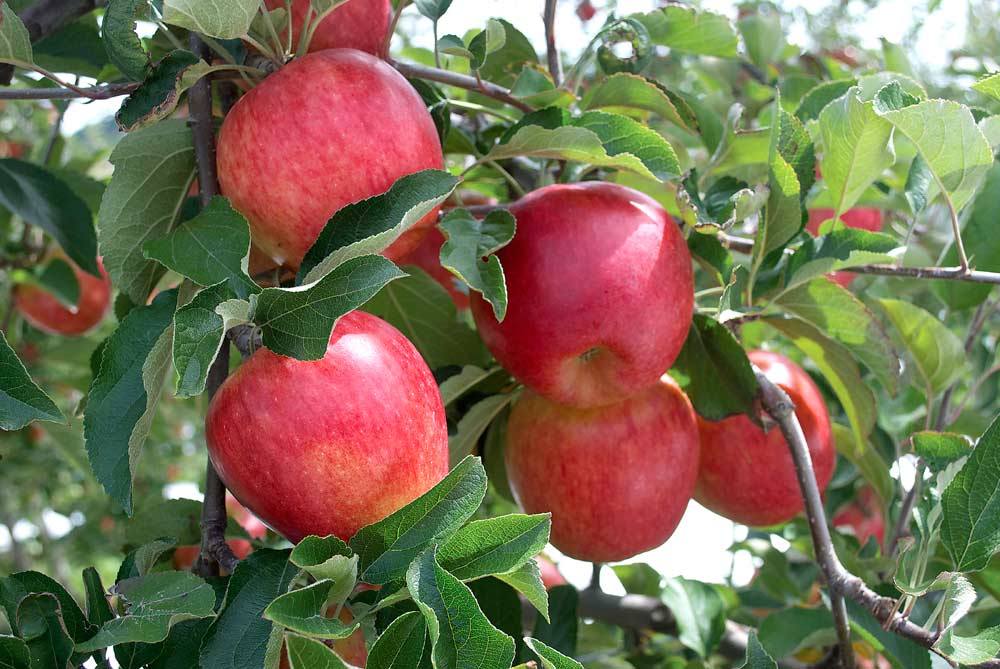
Plumac is a chance seedling discovered in New Zealand. It is sold under the Koru brand and will be produced in the United States and Europe, as well as New Zealand. (Courtesy of Sean Gilbert)
This article has been updated.
U.S. apple marketing desks are selling the first commercial crop of Koru, a tart-sweet bi-color apple from New Zealand.
So far, the three U.S. companies licensed to sell Koru, pronounced CORE-oo, have about 50,000 40-pound boxes to work with this year. However, they expect that number to reach 1.4 million boxes by 2022, said Bruce Turner, national marketing representative for Oneonta Starr Ranch Growers of Wenatchee, Washington. The other two companies are Chelan Fresh in Chelan, Washington, and New York Apple Sales.
The Koru is produced in the United States by roughly 20 grower-owners of the Coast to Coast Cooperative, licensed to propagate the apple by McGrath Nurseries, the New Zealand owners of the patent and trademark.
Northeast growers, most of them in New York, harvested about 3,000 boxes in 2016, sent Koru to a few specialty outlets and one limited run to a chain in the Southeast, said Jim Allen, vice president of marketing for New York Apple sales, a marketing desk in Albany. In 2017, they harvested 14,000 boxes. Half of those have been shipped to stores while the other half is scheduled to come out of controlled-atmosphere storage in March. Imports from New Zealand fill store shelves from May through September, Turner said.
The new apple, a cross between a Fuji and Braeburn, was discovered as a chance seedling in 1998 in New Zealand and propagated with the cultivar name of Plumac, later trademarked as Koru, an aboriginal term for a fern frond unfurling to form a new leaf, literally translated as “new beginning.” The marketers describe Koru as a bi-colored apple with an unusual orange hue with a tart-sweet taste.
The first U.S. plantings started in 2012 in the Northeast with Washington growers boosting acreage in 2015 and planting even more in 2016 and 2017. Up until this year, growers harvested only enough for a few specialty shops and storage testing.
The three Coast to Coast members expect the apple to be a hit and have invested heavily in ramping up domestic production to have enough for a year-round supply, Turner said.
“We’ve been planting like mad,” Turner said.
Getting enough budwood and seedlings was the limiting factor.
Already, the variety has cracked the Top 20 in the Nielsen ratings, the only seasonal apple to do so, he said.
F.O.B prices have been in the low $40 range, said Mac Riggan, Chelan Fresh director of marketing.
The challenge will be to compete with a crowded field of new apple varieties, said Coast to Coast growers and shippers.
“There’s a lot of new apples out there,” said Allen of New York Apple Sales.
They hope the apple’s history resonates with shoppers. It didn’t come from years and years of laboratory breeding but from what the nursery owners suspect was a discarded Fuji in a rose garden coincidentally pollinated with a Braeburn.
“Which is kind of a fun story to tell,” said Eric Borton, director of business development for Borton Fruit, a Yakima, Washington, company that grows and packs for Chelan Fresh. •
—by Ross Courtney
This article has been updated. The print version will be corrected as follows:
“A story about the Koru apple in the March 15, 2018, issue of Good Fruit Grower was unclear about the membership of the Coast to Coast Growers Cooperative. Roughly 20 growers throughout the United States own the cooperative, licensed by the New Zealand patent and trademark owners. Oneonta Starr Ranch Growers of Wenatchee, Washington, Chelan Fresh of Chelan, Washington, and New York Apple Sales — all mentioned in the story — are marketing agencies licensed to market the Koru but have no ownership in the cooperative.”






How can they be so sure its Fuji x Braeburn when it was a chance seedling?
Good Question, YumApple. The New Zealand growers who found the Koru ran DNA tests to confirm its parentage. That detail was reported in this earlier story about the apple. https://goodfruit.com/new-zealand-apple-koru-finds-fans/